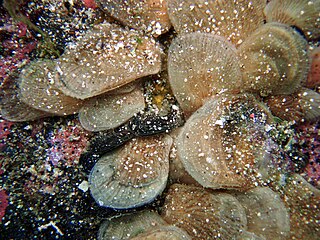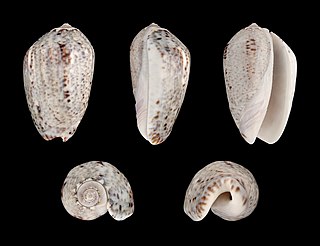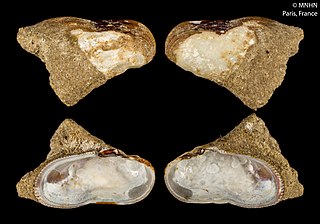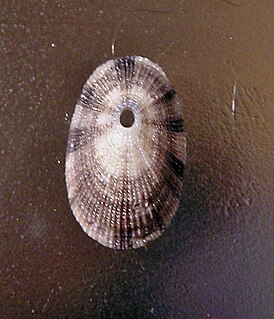
A seashell or sea shell, also known simply as a shell, is a hard, protective outer layer usually created by an animal that lives in the sea. The shell is part of the body of the animal. Empty seashells are often found washed up on beaches by beachcombers. The shells are empty because the animal has died and the soft parts have been eaten by another animal or have decomposed.

Mactridae, common name the trough shells or duck clams, is a family of saltwater clams, marine bivalve mollusks in the order Venerida.

Glycymerididae, often misspelled as Glycymeridae, common names dog cockles or bittersweets, is a worldwide family of salt water clams, marine bivalve mollusks in the order Arcida. They are related to the ark clams. This family contains 45 extant species in four genera.

Isognomon is a genus of marine bivalve mollusks which is related to the pearl oysters.

Argopecten is a genus of saltwater clams, or scallops, marine bivalve mollusks in the family Pectinidae.

Opeatostoma pseudodon, common name the thorn latirus or banded tooth latirus or red footed conch, is a species of predatory sea snail, a marine gastropod mollusk in the family Fasciolariidae, the tulip snails and spindle snails.

Muricanthus radix, the radix murex or root murex, is a species of sea snail, a marine gastropod mollusk in the family Muricidae, the murex snails or rock snails.

Oliva incrassata, the Angled Olive or Giant Olive, is a species of sea snail, a marine gastropod mollusk in the family Olividae, the olives.

Hyotissa is a genus of large saltwater oysters, marine bivalve mollusks in the family Gryphaeidae.

Monoplex pilearis, common name the hairy triton, is a species of medium-sized predatory sea snail, a marine gastropod mollusk in the family Cymatiidae.

Gregariella is a genus of mussels in the family Mytilidae.

Macrocypraea cervinetta, the little deer cowry, is a species of sea snail, a cowry, a marine gastropod mollusk in the family Cypraeidae, the cowries.

Diodora inaequalis is a species of sea snail, a marine gastropod mollusk in the family Fissurellidae, the keyhole limpets and slit limpets.

Pseudozonaria nigropunctata, common name the black-spotted cowry, is a species of sea snail, a cowry, a marine gastropod mollusk in the family Cypraeidae, the cowries.

Dosinia dunkeri is a species of saltwater clam, a marine bivalve mollusc in the family Veneridae.

Pusula radians, the "radiant button shell"or "radiating trivia", is a species of small sea snail, a marine gastropod mollusk in the family Triviidae, the false cowries or trivias.

Modiolus capax, common name fat horsemussel, is a species of "horse mussel", a marine bivalve mollusc in the family Mytilidae, the mussels. It was first described to science by American malacologist Timothy Abbott Conrad in 1837. The type specimen was collected in San Diego by Thomas Nuttall.

Tagelus californianus, common name California tagelus, is a species of saltwater clams, marine bivalve mollusks belonging to the family Solecurtidae.

Eurytellina simulans is a species of bivalve mollusc. This species was previously known as Tellina simulans. The animal was originally described to science by naturalist Charles Baker Adams, a professor of zoology at Amherst College. Adams left for an expedition to Panama in mid-November 1850. He collected furiously upon arrival and on January 3, 1851 shipped eight crates back to Massachusetts. These contained 41,830 specimens of 516 species of molluscs. He described Tellina simulans on the basis of a single valve.

Megapitaria squalida, the chocolate clam, is a species of bivalve mollusc in the family Veneridae. It was first described to science by George Brettingham Sowerby, a British conchologist, in 1835. The type specimen was collected by Hugh Cuming.





















